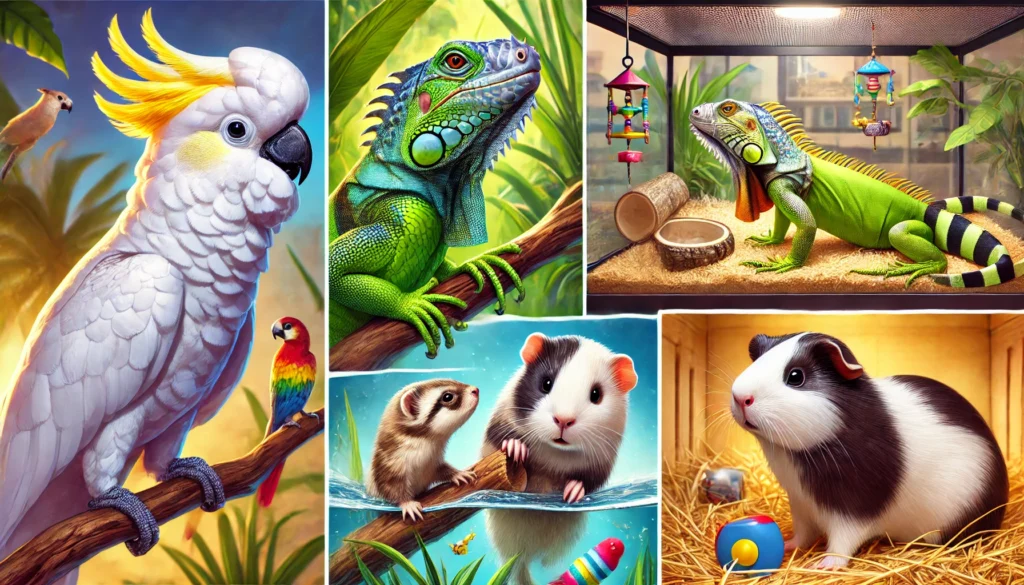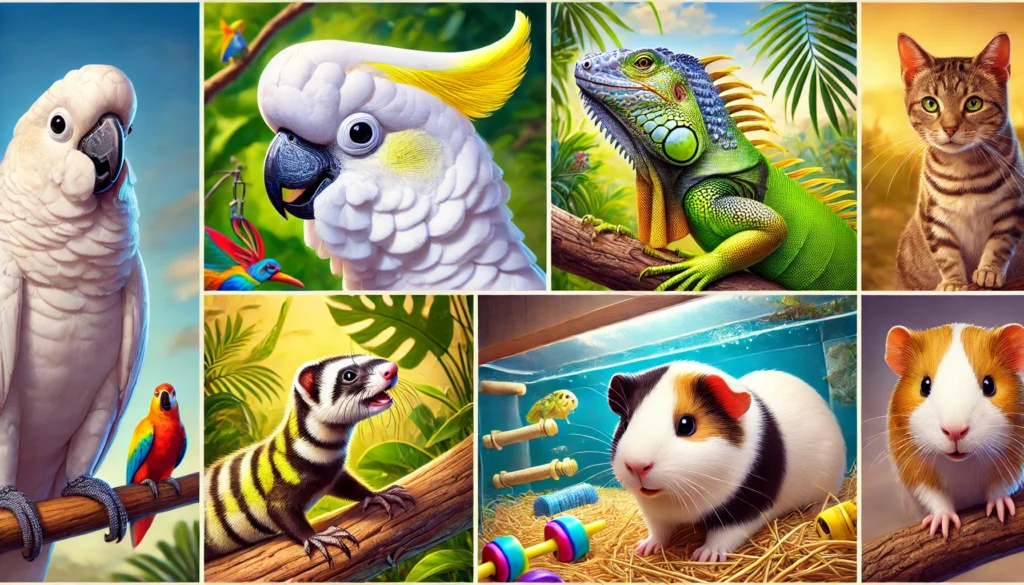Owning an exotic animal as a pet is a dream for many animal lovers. The idea of having a creature at home that is out of the ordinary, with unique characteristics and fascinating behaviors, is quite attractive. However, it is crucial to understand that caring for an exotic animal requires special attention, specific knowledge and, above all, legality.
In Brazil, there are strict regulations for the ownership of these animals. Therefore, if you are considering owning an exotic animal, it is essential to be well informed about which species are allowed and what care is required. Let's explore the top 5 exotic animals allowed in Brazil, discussing their characteristics, necessary care and the legalities involved.
Cockatoo: Beauty and Intelligence in Feathers
The cockatoo is an exotic bird that is very popular among bird lovers. Originally from Australia, they are known for their dazzling white feathers and distinctive yellow crest. In addition to being visually appealing, cockatoos are extremely intelligent and can learn to imitate human sounds and words, making them excellent interactive companions.
However, owning a cockatoo requires commitment. They need a lot of attention and mental stimulation to stay healthy and happy. Proper nutrition, with a varied diet that includes seeds, fruits and vegetables, is essential. Furthermore, it is essential to ensure that the bird has adequate space to fly and exercise. Cockatoos are also known to live for many years, and can live up to 60 years in captivity, which requires a long-term commitment.
On the other hand, the owner of a cockatoo needs to be aware that these birds have a very strong social behavior and require constant interaction. Otherwise, they may develop behavioral problems, such as feather plucking. Therefore, it is recommended that the home environment is enriched with toys and mental challenges to keep the bird engaged.

Iguana: A Fascinating Reptile
Iguanas are exotic reptiles that have gained popularity as pets in Brazil. Originally from Central and South America, these caterpillars can grow quite large, measuring up to 1.5 meters in length. Their vibrant colors and calm demeanor make them attractive to those who want a striking-looking exotic animal.
However, iguanas require specific care. They need an environment that simulates their natural habitat, with a controlled temperature and adequate humidity. Your diet should be rich in green vegetables, fruits and legumes, avoiding foods that could be harmful to your health. Another important aspect is ensuring they have ample space so they can move freely, and accessories such as climbing branches and rocks are essential for their well-being.
Furthermore, it is vital to understand that iguanas are animals that require a lot of patience from the owner, especially at the beginning. They can take time to get used to human handling, and the socialization process must be done with care and respect for the animal's limits. Therefore, it is recommended that the owner is prepared to dedicate time and effort to creating a bond with their pet.
Ferret: Small, Agile and Curious
Ferrets are extremely curious and playful small mammals. They are known for their agility and energy, making them very fun pets. In Brazil, the possession of ferrets is permitted, as long as they are purchased from legal breeders and have adequate documentation.
Caring for a ferret requires attention to its diet, which must be rich in proteins and fats. They also need a safe environment to explore, with plenty of opportunities for play and exercise. Ferrets are social animals, so it is recommended that they have constant interaction with their owners or other ferrets to avoid destructive behaviors resulting from boredom.
Additionally, it is important to note that ferrets have a natural tendency to hide and explore small spaces. Therefore, it is crucial to ensure that the house is puncture-proof and that there are enough toys to keep them occupied. Additionally, ferrets need regular veterinary care to prevent diseases common among the species, such as dental problems and adrenal disease.
Water Tiger Turtle: Tranquility in Aquariums
The water tiger tortoise, also known as the red-eared turtle, is an aquatic reptile that is highly prized as a pet. Originally from the United States, he adapted well to the Brazilian climate and is allowed as a pet in the country.
Keeping a water tiger tortoise requires creating a suitable aquatic habitat, with clean, filtered water, as well as a dry place where it can warm up. This reptile's diet must be balanced, consisting of specific foods, vegetables and small invertebrates. Cleaning the aquarium is essential for the tortoise's health, preventing common diseases in poorly maintained aquatic environments.
Furthermore, it is essential that the aquarium has an efficient filtration system and a UVB lamp, which helps in the synthesis of vitamin D3, essential for the reptile's bone health. A place where the tortoise can warm up and rest is also necessary, as these animals need temperature cycles to regulate their metabolism.
Guinea Pig: A Friendly Small Rodent
Guinea pigs are small rodents that are very popular in Brazil. They are known for being docile and easy to handle, making them an excellent choice for families with children. Additionally, they are relatively easy to care for as long as their basic needs are met.
Guinea pigs' diet should include hay, fresh vegetables and species-specific food. They also need adequate space to move around, with toys and hiding places that provide mental and physical stimulation. Regular cleaning of the environment is crucial to prevent diseases and ensure the animal's health.
Still, guinea pigs are animals that need social interaction and constant stimulation. Therefore, it is beneficial to keep more than one guinea pig together as they are naturally social. Furthermore, it is important to ensure that the cage is always clean and that the diet is balanced to avoid common health problems, such as obesity and nutritional deficiencies.

Legal and Ethical Considerations
Having an exotic animal as a pet in Brazil requires not only specific care, but also compliance with legal regulations. It is essential to purchase these animals from legal breeders and avoid purchasing species illegally captured in the wild. Appropriate documentation, such as the ownership license, must always be up to date to avoid problems with environmental authorities.
Additionally, it is important to consider the ethical responsibility of keeping an exotic animal. These animals often have very different needs from conventional pets and require a significant commitment in terms of time, resources and knowledge. The decision to have an exotic animal must be well thought out and based on the ability to provide a suitable environment and appropriate care.
Another crucial point is awareness about species preservation. Acquiring an exotic animal irresponsibly can contribute to illegal animal trafficking and put species at risk of extinction. Therefore, the choice must be made ethically and informed, always seeking reliable sources that respect environmental standards.
Conclusion
Exotic animals can bring a unique and fascinating dimension to the experience of having a pet. In Brazil, options such as the cockatoo, iguana, ferret, water tiger tortoise and guinea pig are legally available and, with the right care, can become wonderful companions.
However, it is essential to understand and respect the specific needs of each species, ensure the legality of ownership and be prepared for the commitment that these animals require. Thus, it is possible to enjoy an enriching and harmonious coexistence with these incredible exotic animals.
